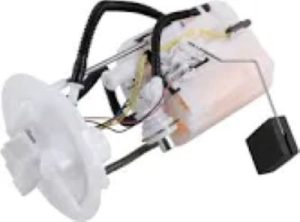While a bad fuel pump can lead to various problems, one of the most typical side effects is having too many difficulties starting the engine. When the fuel pump is not developing sufficient pressure it may take longer to build up enough pressure for starting, which can mean prolonged cranking times. Fuel injected engines typically require only 40-60 psi of fuel pressure to run correctly, and if the pump isn't suppling enough, this then results in a hard start condition. Just a 5-psi drop to 30 psi, as occurs on many new vehicles, including Ford Mustangs (though this GMC would not start below the magic 36 or 37 psi while it should have remained above that figure according to Mr. Swift) can lead to hard starts and may prevent a cold engine from starting at all.
When the pump cannot deliver continuous fuel flow one of these problems is engine sputtering at highway speeds. An engine misfire or hesitation when the vehicle accelerates, or is under load at highway speeds may be a sign that the fuel pump cannot generate enough forced volume. With a particularly high fuel demand, like our truck has, the inability of the pump to keep up (thus breaching its pressure relief valve) can cause fuel starvation. E.g. a 300LPH pump flowing at 250 LPH will cause the engine of hesitate or stall under heavy load.
If the fuel pump is failing, it can also lead to less fuel efficiency. A faulty pump might then not deliver the correct amount of fuel, therefore either too much or too little fuel will be let into the engine. In any case, it will reduce the fuel efficiency of your car from about 10-20%, based on how bad the problem is. One of the first warning signs an imp Plus, in larger vehicles like trucks or SUV's this can lead to a lot of fuel cost down the line.

A suspect sound that can be emanated from the fuel tank is another sign of a bad fuel pump. This is common whining or humming News about the pump are in every city because he is starting to work more badly (to develop power has to put it under boost) — but diesel generators do not stop so. This noise is commonly the result of worn out or damaged internal components of the pump as in its motor, bearings etc. A normal functioning pump will produce a low humming sound, and as that noise progresses into louder annoying sounds, it means the pump is close to failure and it may soon stop working entirely.
Another symptom is loss of power under acceleration, and this effect may be more pronounced when climbing hills or towing heavy loads. It could also seem like the engine is just slow to respond when pressure demand for fuel exceeds what the fuel pump can deliver. For high-performance vehicles, where fuel requirements can increase by 50-100% during acceleration, a weak pump can starve the engine of the necessary amount of fuel to produce horsepower and torque.
If the problem is not fixed, this results in stalling while driving due to a bad fuel pump. In a worst-case scenario, the pump could stop working altogether, disabling fuel delivery to the engine and leaving a consumer stranded. This can obviously be a particularly hazardous situation on the highway or while battling through traffic, where unanticipated power loss may result in multiple car crashes.
Basis — Fuel Pump problems diagnosis and replacementIf you want your car to run smoothly without any errors, then go & check out the link now.
